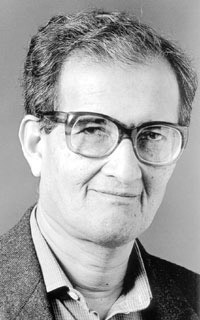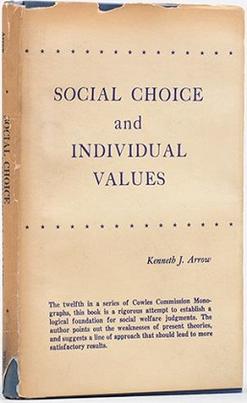
Arrow's impossibility theorem is a key result in social choice theory, showing that no ranking-based decision rule can satisfy the requirements of rational choice theory. Most notably, Arrow showed that no such rule can satisfy independence of irrelevant alternatives, the principle that a choice between two alternatives A and B should not depend on the quality of some third, unrelated option C.

In welfare economics and social choice theory, a social welfare function—also called a socialordering, ranking, utility, or choicefunction—is a function that ranks a set of social states by their desirability. Each person's preferences are combined in some way to determine which outcome is considered better by society as a whole. It can be seen as mathematically formalizing Rousseau's idea of a general will.
Independence of irrelevant alternatives (IIA) is a major axiom of decision theory which codifies the intuition that a choice between and should not depend on the quality of a third, unrelated outcome . There are several different variations of this axiom, which are generally equivalent under mild conditions. As a result of its importance, the axiom has been independently rediscovered in various forms across a wide variety of fields, including economics, cognitive science, social choice, fair division, rational choice, artificial intelligence, probability, and game theory. It is closely tied to many of the most important theorems in these fields, including Arrow's impossibility theorem, the Balinski-Young theorem, and the money pump arguments.
The Gibbard–Satterthwaite theorem is a theorem in voting theory. It was first conjectured by the philosopher Michael Dummett and the mathematician Robin Farquharson in 1961 and then proved independently by the philosopher Allan Gibbard in 1973 and economist Mark Satterthwaite in 1975. It deals with deterministic ordinal electoral systems that choose a single winner, and shows that for every voting rule of this form, at least one of the following three things must hold:
- The rule is dictatorial, i.e. there exists a distinguished voter who can choose the winner; or
- The rule limits the possible outcomes to two alternatives only; or
- The rule is not straightforward, i.e. there is no single always-best strategy.

A random ballot or random dictatorship is a randomized electoral system where the election is decided on the basis of a single randomly-selected ballot. A closely-related variant is called random serialdictatorship, which repeats the procedure and draws another ballot if multiple candidates are tied on the first ballot.

Welfare economics is a field of economics that applies microeconomic techniques to evaluate the overall well-being (welfare) of a society.

In social choice theory, May's theorem, also called the general possibility theorem, says that majority vote is the unique ranked social choice function between two candidates that satisfies the following criteria:

The median voter theorem in political science and social choice theory, developed by Duncan Black, states that if voters and candidates are distributed along a one-dimensional spectrum and voters have single-peaked preferences, any voting method that is compatible with majority-rule will elect the candidate preferred by the median voter. The median voter theorem thus shows that under a realistic model of voter behavior, Arrow's theorem, which essentially suggests that ranked-choice voting systems cannot eliminate the spoiler effect, does not apply, and therefore that rational social choice is in fact possible if the election system is using a Condorcet method.

The liberal paradox, also Sen paradox or Sen's paradox, is a logical paradox proposed by Amartya Sen which shows that no means of aggregating individual preferences into a single, social choice, can simultaneously fulfill the following, seemingly mild conditions:
- The unrestrictedness condition, or U: every possible ranking of each individual's preferences and all outcomes of every possible voting rule will be considered equally,
- The Pareto condition, or P: if everybody individually likes some choice better at the same time, the society in its voting rule as a whole likes it better as well, and
- Liberalism, or L : all individuals in a society must have at least one possibility of choosing differently, so that the social choice under a given voting rule changes as well. That is, as an individual liberal, anyone can exert their freedom of choice at least in some decision with tangible results.

Social choice theory is a branch of welfare economics that analyzes methods of combining individual opinions, beliefs, or preferences to reach a collective decision or create measures of social well-being. It contrasts with political science in that it is a normative field that studies how societies should make decisions, whereas political science is descriptive. Social choice incorporates insights from economics, mathematics, philosophy, political science, and game theory to find the best ways to combine individual preferences into a coherent whole, called a social welfare function.

Positional voting is a ranked voting electoral system in which the options or candidates receive points based on their rank position on each ballot and the one with the most points overall wins. The lower-ranked preference in any adjacent pair is generally of less value than the higher-ranked one. Although it may sometimes be weighted the same, it is never worth more. A valid progression of points or weightings may be chosen at will or it may form a mathematical sequence such as an arithmetic progression, a geometric one or a harmonic one. The set of weightings employed in an election heavily influences the rank ordering of the candidates. The steeper the initial decline in preference values with descending rank, the more polarised and less consensual the positional voting system becomes.

Kenneth Arrow's monograph Social Choice and Individual Values and a theorem within it created modern social choice theory, a rigorous melding of social ethics and voting theory with an economic flavor. Somewhat formally, the "social choice" in the title refers to Arrow's representation of how social values from the set of individual orderings would be implemented under the constitution. Less formally, each social choice corresponds to the feasible set of laws passed by a "vote" under the constitution even if not every individual voted in favor of all the laws.

The Kemeny–Young method is an electoral system that uses ranked ballots and pairwise comparison counts to identify the most popular choices in an election. It is a Condorcet method because if there is a Condorcet winner, it will always be ranked as the most popular choice.

In social choice theory, a dictatorship mechanism is a degenerate voting rule or mechanism where the result depends on only one person's preferences, without considering any other voters. A serial dictatorship is similar, but also designates a series of "backup dictators", who break ties in the original dictator's choices when the dictator is indifferent.
There are a number of different criteria which can be used for voting systems in an election, including the following

Arunava Sen is a professor of economics at the Indian Statistical Institute. He works on Game Theory, Social Choice Theory, Mechanism Design, Voting and Auctions.

Maximal lotteries refers to a probabilistic voting rule. The method uses preferential ballots and returns a probability distribution of candidates that a majority of voters would weakly prefer to any other.

Black's method is an election method proposed by Duncan Black in 1958 as a compromise between the Condorcet method and the Borda count. This method selects a Condorcet winner. If a Condorcet winner does not exist, then the candidate with the highest Borda score is selected.

The highest median voting rules are a class of graded voting rules where the candidate with the highest median rating is elected.
The median voting rule or median mechanism is a rule for group decision-making along a one-dimensional domain. Each person votes by writing down his/her ideal value, and the rule selects a single value which is the median of all votes.





